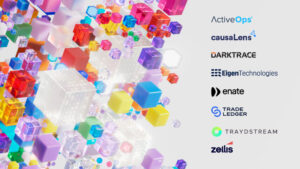
The technical and soft skills needed to succeed with AI in 2020 and beyond
With the right tools and employee skills, every developer can transform into an AI developer, and every company can evolve into an AI company. But for the greatest success, you’ll need to embrace, and nurture among your team, a wide set of technical and soft skills. This could be through self-learning or partnering with another organisation who already has these skills.
Here are some of the key skills that will be needed to synergise with AI in the future digital workplace – from digital skills around computer science, to more human skills like storytelling and decision making.

Modern computer science skills
As new innovations come to life, the skillset we need to fulfil our roles and work alongside technology is continuously evolving. With each day comes new skills to learn in the area for computer science. One of the key modern computer science skills that’s needed for the digital workplace is known as AI engineering – the ability to bring together a solution from pre-built machine learning models, like the Azure Cognitive Services.
In this new world of AI tooling, computer science and engineering skills are often the most straight forward to find online material for helping you to learn.
Microsoft has a certification called the ‘Azure AI Engineer’ for people who want to develop into this role. If you want to start your journey there’s a wealth of learning content available at Microsoft Learn.
Maths and statistic skills
1. Bias detection and handling
Bias lives, captured, in your data. Being able to detect and handle it appropriately is crucial to ensure the fairness of decision-making. This is a statistical skill very closely related to model selection for transparency, and is a key skill for data scientists.
The approach we take is to document every step in a team’s solution development journey. From how they see the problem they are trying to solve to who is on the team and what data has been used. This way we have a clear path to accountability and steps to correct should any issues be uncovered.
2. Societal and environmental impact assessment
These skills, which include those of triple bottom line economics, can most readily be found within the social sciences and economists. They’re not always taught to data scientists. A key question for the next phase of AI is how we integrate these interdisciplinary skills into organisations.
3. Data-driven decision-making and storytelling
The leaders within your organisation need a level of data literacy that enables them to take advantage of the new knowledge data delivers. The skills of data-driven decision-making must be learnt; it doesn’t come naturally to many who are used to working on ‘gut feel’ and ‘experience’. Data scientists working with you should also learn how to tell which data-driven stories could be successful. This includes introducing ethical clarity.
Business skills
1. Lifelong learning
There are many resources for learning the skills necessary to bring data and AI into the heart of organisational digital transformation. However, this still requires everyone within the organisation to be a lifelong learner. Doing so helps employees adapt to the digital workplace, and take full advantage of the new tools and data available. The key to success lies in bringing your employees along the journey and creating a learn-it-all culture.
2. AI collaboration
New AI tools have and will always get smarter. Organisations must learn how to integrate these tools into their teams. It’s not about keeping these new tools separated; it’s about bringing them into the heart of your organisation and working with them. This means everyone – from the Board, through the C-suite, to the front-line workers – needs to learn how to integrate AI into their work, how the technology augments their role, and the benefits it brings.
3. Empathy, awareness and digital sociology
Data and AI require the dual approach of technical and human skills. Having spent 15 years as a programmer, those technical skills come naturally. The machine is what mattered. With the advent of AI, I’ve had to learn to have greater empathy for employees affected by new technologies. As part of this, I’ve learnt to increase my awareness through interdisciplinary study, learning about ethical considerations and how to consider the impact of my technical work on the world around me. The new field of Digital Sociology is one of the most exciting fields of study. Passionate people are studying how our digital and social life integrate. They are the ones who help us see the impact of our decisions before it the negative outcomes are made real – because, in data, human skills are the most important skills to succeed.
Find out more
Explore the AI Business School
Download the report: Accelerating competitive advantage with AI
Discover how we’ve created a learn-it-all culture at Microsoft
About the author
 Phil is a big, beardy data geek who loves working with data and solving interesting data problems. He’s especially interested in soft skills for technical people in data, empathy, ethics and in the impact of data on what people know and how they know it. Starting his career with a BA in AI, Phil has worked in a wide range of industries from architecture to advertising. He was also CTO and technical founder of a data start-up. Phil now works at Microsoft as a Cloud Solution Architect for Data & AI in One Commercial Partner.
Phil is a big, beardy data geek who loves working with data and solving interesting data problems. He’s especially interested in soft skills for technical people in data, empathy, ethics and in the impact of data on what people know and how they know it. Starting his career with a BA in AI, Phil has worked in a wide range of industries from architecture to advertising. He was also CTO and technical founder of a data start-up. Phil now works at Microsoft as a Cloud Solution Architect for Data & AI in One Commercial Partner.




